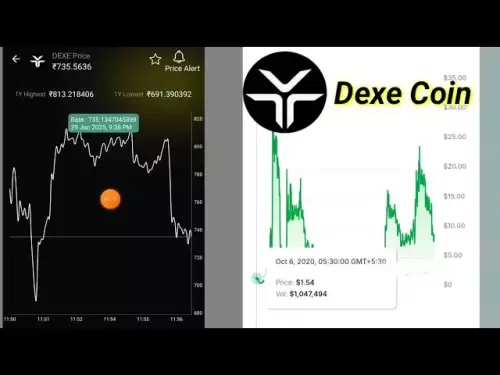-
 Bitcoin
Bitcoin $108,165.4587
0.78% -
 Ethereum
Ethereum $2,456.3517
1.15% -
 Tether USDt
Tether USDt $1.0003
0.00% -
 XRP
XRP $2.1934
0.05% -
 BNB
BNB $650.0935
0.52% -
 Solana
Solana $151.3905
2.69% -
 USDC
USDC $0.9998
0.00% -
 TRON
TRON $0.2751
-0.32% -
 Dogecoin
Dogecoin $0.1640
0.87% -
 Cardano
Cardano $0.5631
0.57% -
 Hyperliquid
Hyperliquid $38.7115
4.69% -
 Bitcoin Cash
Bitcoin Cash $493.1868
-0.39% -
 Sui
Sui $2.8217
3.61% -
 Chainlink
Chainlink $13.3994
2.08% -
 UNUS SED LEO
UNUS SED LEO $9.1632
0.94% -
 Avalanche
Avalanche $18.0318
1.97% -
 Stellar
Stellar $0.2388
0.35% -
 Toncoin
Toncoin $2.8763
1.41% -
 Shiba Inu
Shiba Inu $0.0...01160
1.59% -
 Litecoin
Litecoin $86.6393
1.29% -
 Hedera
Hedera $0.1485
0.16% -
 Monero
Monero $315.7948
1.56% -
 Polkadot
Polkadot $3.4240
1.88% -
 Bitget Token
Bitget Token $4.6314
-0.44% -
 Dai
Dai $0.9998
-0.01% -
 Ethena USDe
Ethena USDe $1.0002
-0.01% -
 Uniswap
Uniswap $7.2110
2.59% -
 Aave
Aave $270.6087
6.07% -
 Pi
Pi $0.5350
0.52% -
 Pepe
Pepe $0.0...09545
1.26%
How does Trust Wallet store assets?
Trust Wallet securely stores a wide range of cryptocurrencies on your device, using non-custodial storage and strong encryption to keep your assets safe and accessible.
Apr 03, 2025 at 01:28 am
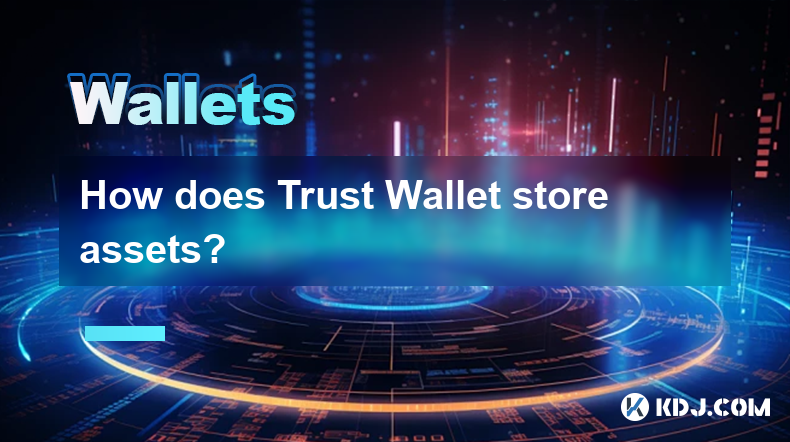
Trust Wallet, a popular mobile cryptocurrency wallet, stores assets in a secure and user-friendly manner. The wallet supports a wide range of cryptocurrencies and tokens, including Bitcoin, Ethereum, and various ERC-20 tokens. Trust Wallet uses a non-custodial approach, meaning that users have full control over their private keys and funds. This is achieved through the use of local storage on the user's device, ensuring that the wallet does not hold any of the user's assets. Instead, Trust Wallet provides the tools and interface for users to manage their own assets directly.
Non-Custodial Storage
Trust Wallet's non-custodial nature means that the wallet does not have access to your private keys or funds. When you create a wallet, a unique set of private and public keys is generated locally on your device. The private key is encrypted and stored only on your device, ensuring that no third party, including Trust Wallet, can access your funds. This approach significantly enhances security, as users are responsible for safeguarding their own keys. If you lose your device or it gets stolen, your funds remain secure as long as your private key remains uncompromised.
Local Storage on Device
All data related to your wallet, including your private keys, is stored locally on your device. This means that your assets are not stored on Trust Wallet's servers, reducing the risk of centralized hacks or data breaches. When you interact with the blockchain, such as sending or receiving cryptocurrencies, Trust Wallet communicates directly with the blockchain network. This ensures that your transactions are processed securely and efficiently. The local storage approach also means that you can access your wallet offline, although you will need an internet connection to perform transactions on the blockchain.
Encryption and Security Measures
Trust Wallet employs several layers of security to protect your assets. Your private key is encrypted using a strong encryption algorithm, ensuring that even if someone gains access to your device, they cannot easily decrypt your private key. Additionally, Trust Wallet supports biometric authentication, such as fingerprint or face recognition, adding an extra layer of security to prevent unauthorized access. The wallet also features a recovery phrase, which is a set of words that can be used to restore your wallet on a new device. It is crucial to keep this recovery phrase secure and never share it with anyone.
Multi-Currency Support
Trust Wallet supports a wide range of cryptocurrencies and tokens, making it a versatile choice for users with diverse portfolios. You can store Bitcoin, Ethereum, and numerous ERC-20 tokens, as well as other popular cryptocurrencies like Binance Coin (BNB) and Litecoin (LTC). The wallet's interface allows you to easily switch between different cryptocurrencies and manage your assets efficiently. This multi-currency support is facilitated by Trust Wallet's integration with various blockchain networks, ensuring that you can interact with different blockchains seamlessly.
Decentralized Applications (DApps)
In addition to storing assets, Trust Wallet also allows users to interact with decentralized applications (DApps) directly from the wallet. This feature enhances the utility of the wallet, as users can access a variety of services and applications without leaving the Trust Wallet interface. DApps can include decentralized exchanges, lending platforms, and gaming applications, among others. By integrating DApps, Trust Wallet provides a comprehensive platform for managing and utilizing your cryptocurrencies, making it more than just a storage solution.
Backup and Recovery
Trust Wallet provides robust backup and recovery options to ensure that you can access your assets even if you lose your device. When you first set up your wallet, you are given a recovery phrase, which is a series of words that can be used to restore your wallet on a new device. It is essential to write down this recovery phrase and store it in a secure location. If you need to recover your wallet, you can enter the recovery phrase into Trust Wallet on a new device, and your wallet will be restored with all your assets intact. This feature underscores the importance of keeping your recovery phrase safe and confidential.
User Interface and Experience
Trust Wallet is designed with a user-friendly interface that makes it easy for both beginners and experienced users to manage their assets. The wallet's home screen provides a clear overview of your portfolio, showing the balance of each cryptocurrency you hold. You can easily send and receive cryptocurrencies with just a few taps, and the wallet's built-in QR code scanner simplifies the process of entering recipient addresses. Trust Wallet also offers features like transaction history and price charts, allowing you to track the performance of your assets and make informed decisions.
Integration with Exchanges
Trust Wallet integrates seamlessly with various cryptocurrency exchanges, enhancing its functionality. For instance, users can connect their Trust Wallet to decentralized exchanges like Uniswap or PancakeSwap directly from the wallet's interface. This integration allows you to trade cryptocurrencies without leaving the wallet, providing a convenient and secure way to manage your assets. Additionally, Trust Wallet supports the Binance DEX, enabling you to trade BNB and other tokens directly from your wallet. This feature is particularly useful for users who want to trade without transferring their assets to a centralized exchange.
Staking and Earning
Trust Wallet also supports staking and earning features, allowing users to earn passive income on their cryptocurrency holdings. For example, you can stake your BNB or other supported tokens directly from the wallet and earn rewards. This feature is particularly appealing for users looking to maximize the potential of their assets. Trust Wallet's integration with various staking platforms ensures that you can participate in staking programs without needing to move your assets to another platform. This adds another layer of utility to the wallet, making it a comprehensive tool for managing and growing your cryptocurrency portfolio.
Security Best Practices
While Trust Wallet provides robust security features, it is essential for users to follow best practices to ensure the safety of their assets. Here are some key security tips:
- Always keep your recovery phrase secure and never share it with anyone.
- Enable biometric authentication if your device supports it.
- Regularly update the Trust Wallet app to ensure you have the latest security patches.
- Be cautious of phishing attempts and never enter your private key or recovery phrase on any website or app other than Trust Wallet.
- Use a strong and unique password for your device to prevent unauthorized access.
By following these practices, you can enhance the security of your Trust Wallet and protect your assets from potential threats.
Common Questions
Q: How does Trust Wallet ensure the security of my assets?
A: Trust Wallet ensures the security of your assets through a non-custodial approach, where your private keys are stored locally on your device and encrypted. The wallet also supports biometric authentication and provides a recovery phrase for backup and recovery. Additionally, Trust Wallet regularly updates its app to include the latest security patches and advises users to follow best security practices.
Q: Can I store multiple cryptocurrencies in Trust Wallet?
A: Yes, Trust Wallet supports a wide range of cryptocurrencies and tokens, including Bitcoin, Ethereum, and various ERC-20 tokens. You can easily switch between different cryptocurrencies within the wallet's interface and manage your diverse portfolio efficiently.
Q: How can I recover my wallet if I lose my device?
A: If you lose your device, you can recover your Trust Wallet by using the recovery phrase provided during the initial setup. Simply enter the recovery phrase into Trust Wallet on a new device, and your wallet will be restored with all your assets intact. It is crucial to keep your recovery phrase secure and confidential.
Q: Can I use Trust Wallet to interact with decentralized applications (DApps)?
A: Yes, Trust Wallet allows you to interact with decentralized applications (DApps) directly from the wallet's interface. This feature enables you to access various services and applications, such as decentralized exchanges, lending platforms, and gaming applications, without leaving the Trust Wallet environment.
Q: How does Trust Wallet integrate with cryptocurrency exchanges?
A: Trust Wallet integrates seamlessly with various cryptocurrency exchanges, including decentralized exchanges like Uniswap and PancakeSwap. You can connect your Trust Wallet to these exchanges directly from the wallet's interface, allowing you to trade cryptocurrencies without transferring your assets to a centralized exchange. Trust Wallet also supports the Binance DEX for trading BNB and other tokens.
Q: Can I earn passive income through Trust Wallet?
A: Yes, Trust Wallet supports staking and earning features, allowing you to earn passive income on your cryptocurrency holdings. You can stake your BNB or other supported tokens directly from the wallet and participate in staking programs without needing to move your assets to another platform.
Disclaimer:info@kdj.com
The information provided is not trading advice. kdj.com does not assume any responsibility for any investments made based on the information provided in this article. Cryptocurrencies are highly volatile and it is highly recommended that you invest with caution after thorough research!
If you believe that the content used on this website infringes your copyright, please contact us immediately (info@kdj.com) and we will delete it promptly.
- Do Kwon, Terra (LUNA), Developments: What's the Latest?
- 2025-06-30 04:30:12
- MAGACOIN vs. Dogecoin: Riding the Crypto Growth Wave in 2025
- 2025-06-30 04:30:12
- Dogecoin, Ruvi AI, and Gains: A New Era of Crypto Opportunities?
- 2025-06-30 04:50:12
- Crypto Market Weekly Winners: PENGU and SEI Shine Amidst Volatility
- 2025-06-30 04:57:13
- Altcoin Season, Bitcoin Dominance, and the 2025 Outlook: Will XRP and Cardano Lead the Charge?
- 2025-06-30 04:36:44
- Token Unlocks and Altcoins: Navigating the Massive Release Landscape
- 2025-06-30 04:40:13
Related knowledge
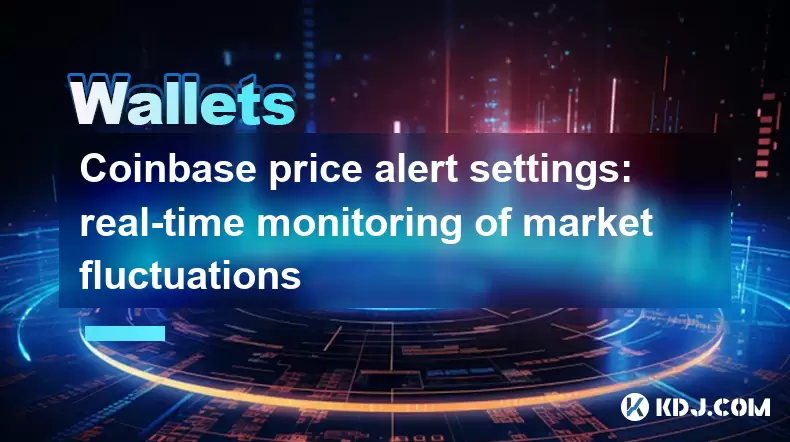
Coinbase price alert settings: real-time monitoring of market fluctuations
Jun 29,2025 at 07:00am
Setting Up Coinbase Price AlertsTo begin real-time monitoring of market fluctuations on Coinbase, users can utilize the built-in price alert feature. This function allows you to receive notifications when a cryptocurrency reaches a specific price point. To access this setting, open the Coinbase app or log in via the web platform. Navigate to the 'Prices...

How to stake cryptocurrencies on Coinbase? Benefits and risks
Jun 27,2025 at 06:36pm
Understanding Cryptocurrency Staking on CoinbaseStaking cryptocurrencies involves locking up digital assets to support the operations of a blockchain network, typically in return for rewards. Coinbase, one of the most popular cryptocurrency exchanges globally, offers staking services for several proof-of-stake (PoS) coins. Users can stake their holdings...
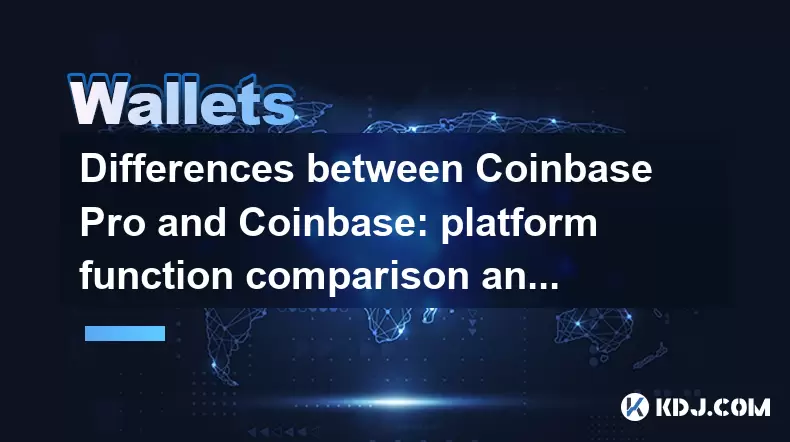
Differences between Coinbase Pro and Coinbase: platform function comparison and analysis
Jun 29,2025 at 08:21am
Overview of Coinbase and Coinbase ProWhen exploring the cryptocurrency trading landscape, users often encounter two platforms under the same parent company: Coinbase and Coinbase Pro. While both are operated by the same organization, they cater to different types of users and offer varying features. Coinbase is primarily designed for beginners and casua...
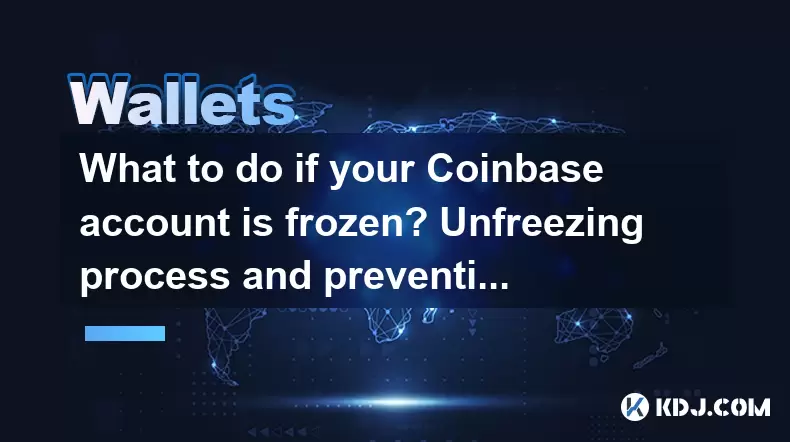
What to do if your Coinbase account is frozen? Unfreezing process and preventive measures
Jun 30,2025 at 03:49am
Understanding Why Your Coinbase Account Might Be FrozenIf your Coinbase account is frozen, it typically indicates that the platform has detected suspicious activity or potential violations of its terms of service. This could be due to a variety of reasons such as unusual login attempts, high-risk transactions, or incomplete verification steps. Coinbase ...

How to contact Coinbase customer service? Support channels and response times
Jun 28,2025 at 01:29pm
Contacting Coinbase Customer Service: Support Channels and Response TimesIf you're a user of Coinbase, reaching their customer service team may become necessary for various reasons, such as account verification issues, transaction disputes, or technical difficulties. Understanding the different support channels available and what to expect in terms of r...

Coinbase advanced trading function usage tutorial: limit orders and market orders
Jun 28,2025 at 09:07pm
Understanding the Difference Between Limit Orders and Market OrdersWhen using Coinbase's advanced trading features, it is crucial to understand the fundamental difference between limit orders and market orders. A market order executes immediately at the best available price on the market. This type of order ensures that your trade goes through quickly, ...

Coinbase price alert settings: real-time monitoring of market fluctuations
Jun 29,2025 at 07:00am
Setting Up Coinbase Price AlertsTo begin real-time monitoring of market fluctuations on Coinbase, users can utilize the built-in price alert feature. This function allows you to receive notifications when a cryptocurrency reaches a specific price point. To access this setting, open the Coinbase app or log in via the web platform. Navigate to the 'Prices...

How to stake cryptocurrencies on Coinbase? Benefits and risks
Jun 27,2025 at 06:36pm
Understanding Cryptocurrency Staking on CoinbaseStaking cryptocurrencies involves locking up digital assets to support the operations of a blockchain network, typically in return for rewards. Coinbase, one of the most popular cryptocurrency exchanges globally, offers staking services for several proof-of-stake (PoS) coins. Users can stake their holdings...

Differences between Coinbase Pro and Coinbase: platform function comparison and analysis
Jun 29,2025 at 08:21am
Overview of Coinbase and Coinbase ProWhen exploring the cryptocurrency trading landscape, users often encounter two platforms under the same parent company: Coinbase and Coinbase Pro. While both are operated by the same organization, they cater to different types of users and offer varying features. Coinbase is primarily designed for beginners and casua...

What to do if your Coinbase account is frozen? Unfreezing process and preventive measures
Jun 30,2025 at 03:49am
Understanding Why Your Coinbase Account Might Be FrozenIf your Coinbase account is frozen, it typically indicates that the platform has detected suspicious activity or potential violations of its terms of service. This could be due to a variety of reasons such as unusual login attempts, high-risk transactions, or incomplete verification steps. Coinbase ...

How to contact Coinbase customer service? Support channels and response times
Jun 28,2025 at 01:29pm
Contacting Coinbase Customer Service: Support Channels and Response TimesIf you're a user of Coinbase, reaching their customer service team may become necessary for various reasons, such as account verification issues, transaction disputes, or technical difficulties. Understanding the different support channels available and what to expect in terms of r...

Coinbase advanced trading function usage tutorial: limit orders and market orders
Jun 28,2025 at 09:07pm
Understanding the Difference Between Limit Orders and Market OrdersWhen using Coinbase's advanced trading features, it is crucial to understand the fundamental difference between limit orders and market orders. A market order executes immediately at the best available price on the market. This type of order ensures that your trade goes through quickly, ...
See all articles





















